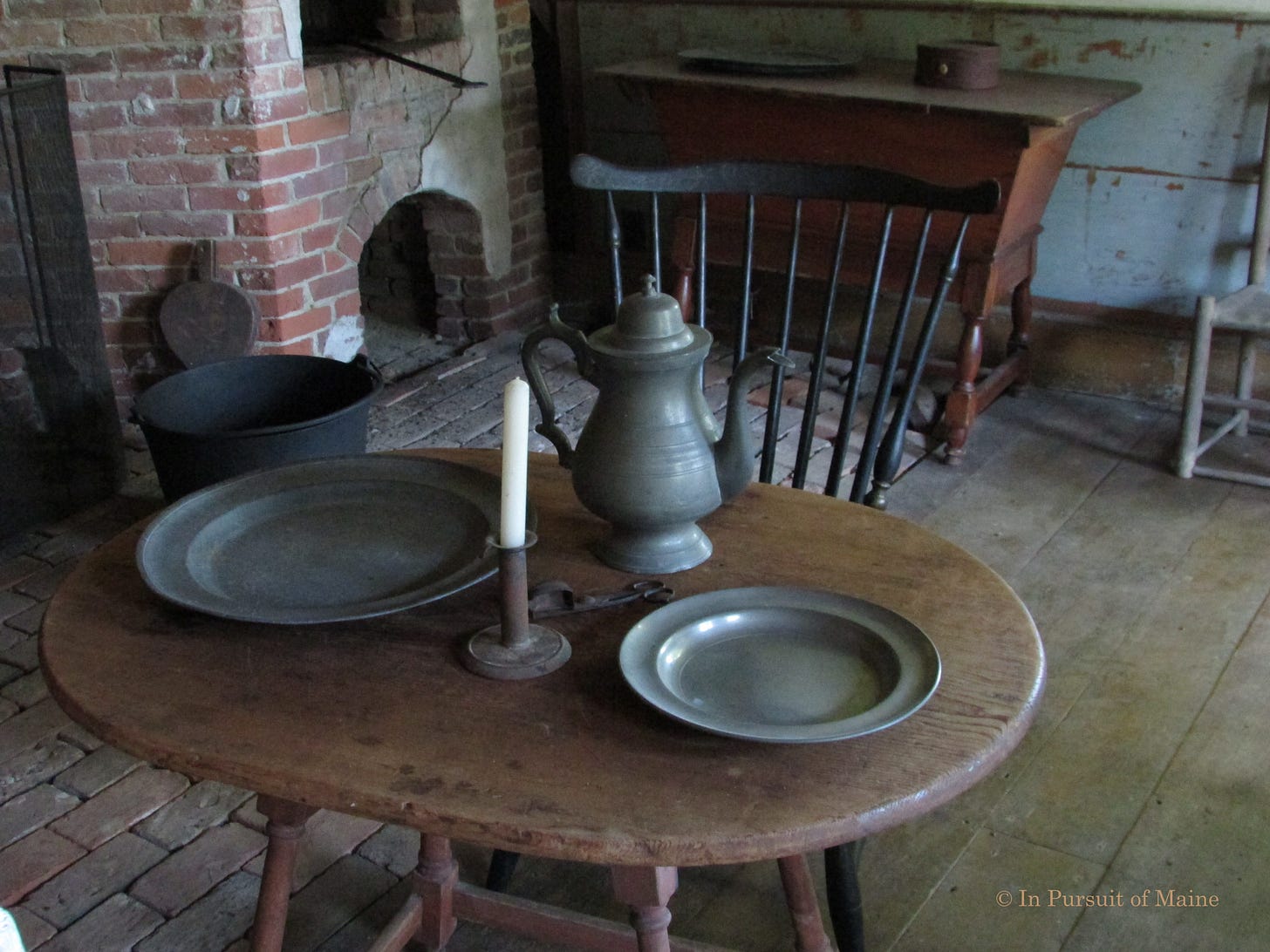I knew even before it was 7 a.m.
it was going to be a day steeped in the past. I seem to be having a lot of them lately. Actually, I guess I’ve always had them, but it’s only now that I’m allowing my secret love affair with the heretofore to become known. Perhaps they will stone me for being a sorceress.
And it’s not about fake nostalgia or flowery ideas about what was in reality a difficult past for the nation or for the world, as today’s new crop of amateur historians might jump to point out. Because really everyone’s past was difficult, and I know that. It’s not about a longing for romance. It is about real memories I have of places I have never been. Or so I’m told and used to believe. But I think I have been there before. Every day is déjà vu.
This stone schoolhouse
was built in 1838 in Phippsburg, Maine by Nathanial Percy, and it remained an active school until 1929. In its day, it was also used as a town meeting hall and even a church. When I look at it, I don’t see an old stone structure. I see men measuring and building and children running and laughing and teachers yelling for students to come in from break. I see old slates and chalk and pencils and thick, yellowed paper and an old potbellied woodstove by the teacher’s desk.
“Ring around the rosie, a pocket full of posies! Ashes, ashes, we all fall down!”
The Popham colony in Phippsburg is the oldest colony in Maine, dating back to 1607. But they never tell you that. They tell you instead about the Mayflower pilgrims of 1620, landing at “Plymouth Rock” (Cape Cod) in Massachusetts. And everyone has forgotten the real history of Maine and the nation. Not me. I don’t think it’s a good idea to forget history or to allow it be rewritten by those who covet it.
This old one-room brick schoolhouse
in Dresden, Maine dates back to 1816. The old stove by the teacher’s desk kept them all . . . if not warm, at least alive. And there’s something to be said for being alive. It’s a good thing to be alive in January when the temperature can easily go down to -10 or -20 F. I always feel more alive when I survive difficulties.
Here are the rules of the day.
I laughed until I thought about electronic cards and retinal identification and chips embedded in hands and full-body x-ray scanners at airports. And ugly, boxy buildings designed by architects who couldn’t build a mud hut. With windows you can’t open. And suddenly the teachers’ rules weren’t that bad.
Rule number seven says that every teacher should lay aside from each pay a goodly sum of his earnings for his benefit during his declining years so that he will not become a burden on society. Personal responsibility. What was wrong with that, again? I forget. Maybe I am getting old.
#6 - “Women teachers who marry or engage in unseemly conduct will be dismissed.”
And rightly so. Those who behave unseemly should not be around children. And women who marry would be too busy taking care of their own children. Remember this was the 1800s. Personal responsibility. It was a different world. Now women can have careers and become old and famous and rich. And alone.
This fireplace is about as tall as I am,
maybe taller. It’s in the old Pownalborough Court House, built in 1761 before these United States were completely united. Actually, they’re still not completely united, but we won’t talk about that in polite company. This place also served as a tavern, post office, and the home of Captain Samuel Goodwin and his family. The family stayed in that home until 1954. Now it’s a museum.
“Will you be having the usual, sir?”
I imagine those words were said to some of the famous guests who came here. John Adams tried a case here and later became the second president of these United States. I wonder if he liked the roast beef with new potatoes? I feel quite certain he did, and I’ve no doubt that he greatly enjoyed the beer. I know I would have.
Benedict Arnold stayed here in this huge three-story building of 1761, built on the banks of the Kennebec River. Robert Treat Paine and William Cushing stayed here, too. Am I still allowed to talk about American history? I was never one to follow rules. Was Benedict Arnold really a traitor? We know for certain that he was one of the bravest, stunningly heroic of all fighters in the American Revolution, risking life and limb for a new country. But later, they say, he went against that new country.
A sailor carved this into the wall
in the 1700s, perhaps after hobnobbing with John Adams. I’ll bet the lady of the house was not pleased with that at all. She most likely thought him highly uncivilized, but now 250 years later we see his masterpiece, which is really just vintage graffiti. One man’s junk is another man’s treasure. Who am I to judge the old limey?
#8 - “Any teacher who smokes, uses liquor in any form, frequents pool or public halls, or gets shaved in a barber shop will give good reason to suspect his worth, intention, integrity and honesty.”
I have an old button my grandfather gave me when I was very little. He said it was a magic button and if I held it tightly and made a wish, any wish I made would come true. It was a real masterpiece, this button. I’ll bet my grandfather would have liked the carving of the ship. He would have laughed at the lady of the house and clapped the old sailor on the back.
For many years I hid the magic button and treated it like gold. I tried to make some wishes on it, but I think I might not have been holding it tightly enough. I once showed it to an old boyfriend, who laughed hysterically and said I was crazy. He lives in England these days, most likely close to where Benedict Arnold lived after the war. So now who’s the crazy one?
Believe it or not, I still have that old button. I’m saving it for an emergency.
My grandmother had old rugs like that.
Can you see them in the photo? She was married to my grandfather with the magic button, for a while anyway. She made the rugs of old rags. All the women did. You didn’t dare to throw out “extra” cloth because there was no such thing as extra cloth—not when it had to be woven on a hand-powered loom. And even later when machines did it, anyone who threw cloth out would have been viewed as a social pariah, a traveling sailor at best who carved graffiti everywhere.
I had an old sled
exactly like the one on the left when I was a child. I have never had a better sled in my life to this day. I don’t know what happened to the old sled. Probably thrown out for something newer. People do that a lot. They throw things out. They throw people out, too.
Maybe we shouldn’t throw anything out anymore, because the replacements are usually abysmal. We used to have newspapermen and reporters, but we threw them out. Now we have sniveling, child-like adults on TV with self-righteous pouts. I wonder what Benjamin Franklin and Hugh Meredith, owners of the Pennsylvania Gazette (the most popular newspaper in the colonies), would think of today’s news reporting? They were most likely friends with Benedict Arnold, who is not sounding so terrible just now.
I can still smell the old wood
of the sled. The things in my memory are not just memories. Somewhere they actually exist on the timeline, because time is an illusion and everything that has ever happened or will ever happen . . . is already there, just doing its thing on the timeline. Creation is finished; it happened all at once—that’s how the story goes. If you haven’t read it, I suggest you go back and do so. In any event, I’m not in that time anymore, but I once was. And if I have anything to say about it—and I do—I will be again.
I knew today would be one of those days steeped in the past . . .
If you’d like to upgrade your subscription to get additional posts and more personalized content, you can do so at the link below:












Another great story Melanie, really good & love those pictures ❤
I love the direction to took on this writing. Such creativity. Thank you for taking me along. Informative and well written.